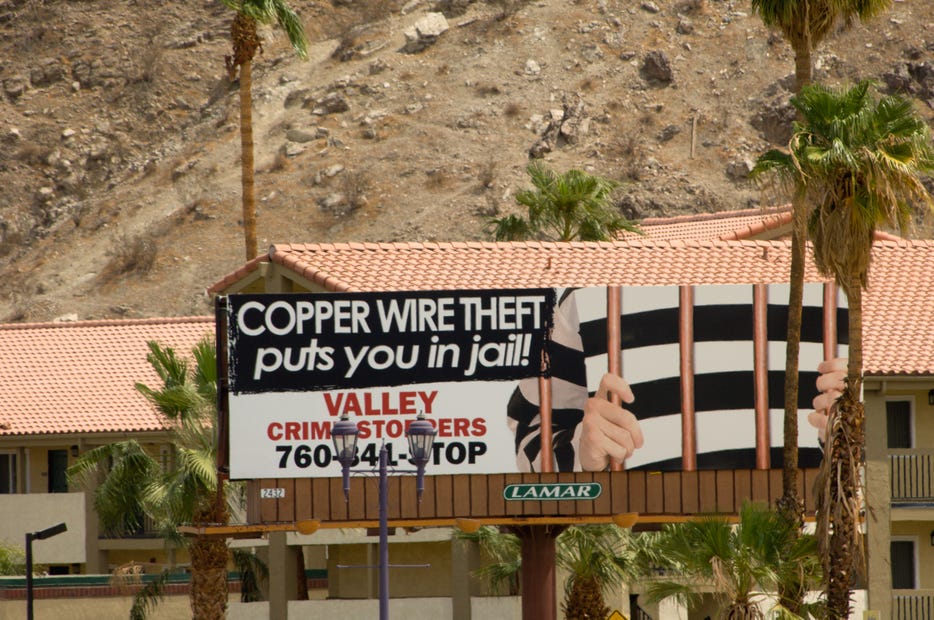Are You Ready for the Attack of the Copper Thieves?Are You Ready for the Attack of the Copper Thieves?
Copper thieves cost U.S. businesses $1 billion a year and are a threat to critical infrastructure. What can you do to prevent putting resiliency at risk?
December 2, 2024

Just when IT managers thought they had accounted for and addressed all possible threats to the health and well-being of their network sites, an unforeseen challenge has emerged. That is the rise in cooper thieves who turn copper lines into gold.
The cash-for-copper phenomenon is not new, but it has evolved into a nationwide problem, resulting in knocked-out lights, interrupted traffic, downed countless websites, and transportation nightmares.
In some cases, crimes are committed by drug addicts looking to get some quick cash. In other cases, crimes are committed by organized groups or opportunistic thieves, such as employees of businesses that work with metal.
Ohio ranks first among the top five states with the most insurance claims for metal thefts, followed by Texas, Georgia, California, and North Carolina. Utilities will pass increased insurance costs to businesses and consumers.
The U.S. Department of Energy has estimated that metal theft costs U.S. businesses around $1 billion a year. From January 1, 2010, through December 31, 2012, NICB analysts identified 33,775 insurance claims for the theft of copper, bronze, brass, or aluminum—32,568 of them (96 percent) for copper alone. This shows a 36 percent increase in claims when compared with the 25,083 claims reported between January 1, 2009, and December 31, 2011.
Cash for copper thieves have expanded their mainstay powerline targets to include harvesting the metal from ground and roof-mounted HVAC units and systems, raising concerns among telecom service providers that disrupting cooling could cause challenges to switching systems, data centers, and POPs without adequate backup systems. Most communications service providers offer service-level agreements (SLA) under which businesses are promised a certain amount of uptime and a mean-time to repair problems, which, if unmet, can result in financial compensation or cancellation of the contract.
How Copper Thieves Disrupt Critical Infrastructure
The FBI reports that electrical substations, cell towers, telephone landlines, railroads, construction sites, and vacant homes are all targets. This can disrupt electricity, telecommunications, transportation, water supply, heating, security, and emergency systems.
Network service resiliency at risk. Examples of the scope of the disruptions abound, including:
Washington State: Copper thefts near Seattle-Tacoma International Airport disabled the approach lighting for one of the airport's runways. Thieves are also stealing copper-based EV charging cords. Lumen, a global communications service provider, has already shelled out $500,000 due to copper thefts in 2024 in Washington alone.
California: In late August, 82 suspects were arrested after tens of thousands of pounds of copper were recovered as part of a crackdown by Los Angeles police and staff on thieves.
Mississippi: Five tornado warning sirens didn't alert residents of impending storms because their copper wires had been stolen, according to a blog by Ooma.
Texas: Metal thieves stole over $10,000 of copper from the Garland, Texas, area before being pursued and arrested by police.
Virginia: After a spike of copper thefts from copper-carrying trucks traveling along Virginia highways, state authorities in Virginia, working with National Insurance Crime Bureau (NICB) special agents, arrested a man at the center of the thefts.
A spike in copper cable thefts in recent months has left AT&T customers in South Dallas, Texas, without phone and internet service on more than a few occasions.

(Credit: FPI / Alamy Stock Photo)
Telcos React to Cooper Thieves
AT&T is collaborating with local officials and the police in the Dallas area. The company offered residents a $10,000 reward for information leading to an arrest and conviction in connection with copper cable thefts. Smaller carriers in less densely populated areas, such as Kinetic, have also offered a $10,000 reward.
Although notifying law enforcement and your service provider(s) when hit by a loss of power to parts of your business seems like a normal reaction, IT managers may want to consider problem prevention. Beset by copper for cash attacks, an industry coalition put together a list of tips to thwart these metal thieves. It is summed up below.
To prevent copper thieves from carrying out their mischief, consider taking the following steps:
Develop a security plan for your business that identifies vulnerabilities. Ask your local law enforcement professionals to assist you with this process.
Deny access by adding fences and gates to contain this private property. Ask your local law enforcement for help in enforcing the law on private property.
Add security lighting to areas where thieves and other criminals may hide.
Deny access to your roof-mounted HVAC units by removing fixed ladders (do not remove fire escapes) and other step-ups, including tree branches.
Consider the use of steel cages to enclose your AC units. The heavier the gauge of steel, the longer it will take to cut. For example, 10–12-gauge steel can take one to two hours to cut. Avoid standard chain link fencing as it can be cut quickly.
Use security cameras, but they must be properly protected, installed, and monitored.
Use alarms mounted to your HVAC units. If the unit is tampered with, including cutting of refrigerant and power lines, an alarm will sound.
A Final Word on Copper Thieves and Net Resiliency
Although law enforcement entities are cracking down on copper thefts, it remains a growing problem across the nation. Hopefully, with enhanced awareness and preventative measures, organizations can sidestep business interruption.
About the Author
You May Also Like




